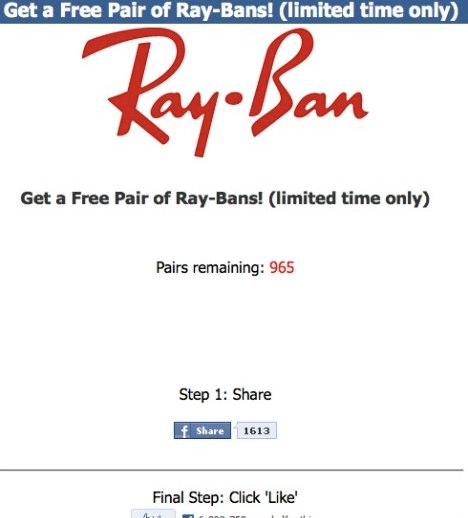If something is popular and a lot of people go to a specific place you are certain that that place is going to be the target of those trying to do wrong. A busy shopping street will attract a lot of pick pockets. A busy website will attract hackers and social media sites like Twitter and Facebook will attract spam and hoaxes.
Usually most marketers know when something is a hoax or not and don’t respond to it. Last Friday however we witnessed a hoax attempt on Facebook go viral. The interesting part there was that most of the people who ‘fell for it’ were marketers. A funny side effect here was that they ‘fell’ for what is part of their own strategy: human psychology.
The Ray-Ban Hoax
So what hoax are we talking about here? Last Friday Facebook was flooded with people liking and sharing a post saying “Get a Free Pair of Ray-Bans! (limited time only)!”
When clicking on the link you were taken to a pages which would suggest there were over 900 pairs left of free Ray Bans. All you had to do is share and like the page.
It looked as if you had the chance to actually win the free pair of glasses, but in fact you didn’t. You were taken to a page where they collected personal information about you. On top of that the user is asked to grant permission to an app that is allowed to post on behalf of the user, in other words: spamming your friends.
The number of ‘available’ glasses would not drop one by one, but in groups, because a piece of script would take a random number off and add another random number. It is a classic ‘survey scam’.
And you would never see any free Ray-Ban coming from this ‘special offer’.
Why was it special?
So a lot of people fell for it. So what? There are many hoaxes where people fall for. What makes this one special?
First of all, it is who fell for it. As said, usually marketers kind of know what is a hoax and what isn’t. Why? Because the same methods are used to get their customers to do what they would like them to do. They should know better.
But more important here was that the marketers fell for the most powerful tactic used in Social Media, the one where the entire principle of Social Media is based on and the one where Google is focussing on: peer pressure.
The marketers shared the hoax, simply because they trusted the people who shared the hoax before them. A remark you saw a lot, after it was clear that it as a hoax, was “well I thought when person X shared it, it must be trustworthy“.
What happened here is a textbook example of how the human mind works and is used in marketing. You act on something because people you trust act on it.
There are two reasons why people do this: because its trust, but more importantly: because there is peer pressure.

What if you do not share and miss out and your friends do get that Ray-Ban? That would hurt because at that moment you are not part of the group, you fall out. It is something people might recognize from when they went to high school. We’ve all done things which we may have thought we didn’t want to do, but we felt the peer pressure of doing it. Not because people are telling you to do it, but because you feel that if you don’t you are not part of the group.
This given is something which is used a lot by marketers. Trying to get a group to do things by hinting on peer pressure: showing that others “do” it as well which will make you go for it as well.
This ‘pressure’ is all over Social Media and Facebook in specific. You are triggered to like pages which your friends have already liked because Facebook shows you the pictures of your friends in the widgets they give out.
Google is also trying to use this tactic. The “People in your social circle +1-ed this” feature in the SERPS is meant to do just that: put peer pressure on you to click on links, trust them. All based on what is in our human nature: we want to live up to the peer pressure.
And this ‘tactic’ is exactly what all the marketers fell for with the Ray-Ban hoax. I wonder if the marketers have learned something here…










